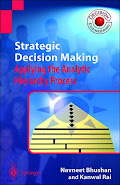We are living in a rapidly globalizing world. In this shifting world, rules of the game can change anytime; success will come to those who adapt quickly to the new rules. And as is common understanding, the best way to adapt to the new rules is to write these rules. In these highly competitive times, with extreme uncertainties and time compressions, it is the successful exploitation of ideas, i.e., Innovation, which can be the only competitive advantage. New ideas can come from -- other industries, your competitors, your employees or your customers.
With the plethora of ideas available and extreme attention the word Innovation is getting (a recent search on Google gives 124 Million hits for the word Innovation), it is imperative that the organizations need to choose the right and relevant ideas to pursue in their quest for competitive advantage. This involves choice, hence decision-making. One of the greatest challenges of human decision-making methodologies has been to help the homo sapiens in choosing the right path out of many alternatives under the conditions of partial, incorrect and stochastic information about the future. To pursue a particular idea (especially a new technological idea) with unknown returns on investment is becoming one of the most risky decision making problem in the new world.
